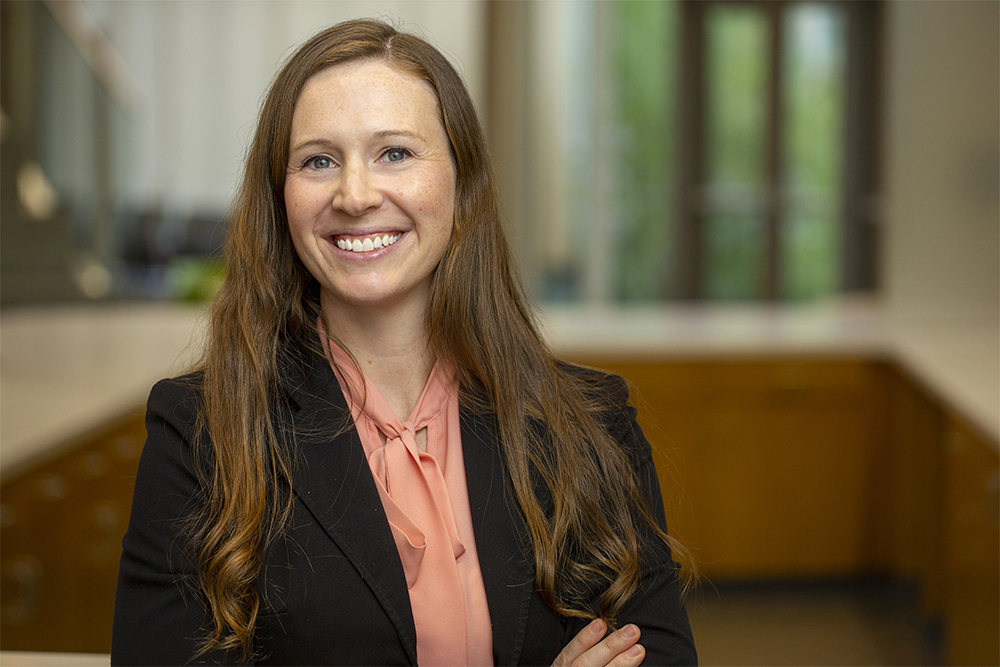Pivotal grant paves way for assistant professor’s independent research
 Julie Bidwell is an assistant professor in the Family Caregiving Institute at the Betty Irene Moore School of Nursing.
Julie Bidwell is an assistant professor in the Family Caregiving Institute at the Betty Irene Moore School of Nursing.Julie Bidwell is one step closer to the researching role she dreamed for herself. The Betty Irene Moore School of Nursing assistant professor recently received a three-year, $450,000 grant from the National Institutes of Health (NIH). It funds her study of hospital-to-home transitions for older adult couples who are managing heart failure.
“As a researcher, this grant is meaningful to me because it provides protected research time, mentorship and training to further develop my research and pursue my goal of improving health and health care for couples and families managing cardiovascular disease,” explained Bidwell, who is also a professor in the school’s Family Caregiving Institute.
A career in scientific research requires years of study and preparation to reach the level of an independent researcher with funded projects. In fact, some studies show that the final transition from junior faculty to primary investigator is perhaps the most difficult. NIH, which manages a significant portion of U.S. government funding, developed the Mentored Research Scientist Career Development Award, also known as the K01 award, to provide support and protected time for an intensive career development experience leading to research independence. Bidwell’s new grant is one of these mentored development awards.
“The NIH K-award mechanism is unique in offering early-stage investigators training, mentorship and project funding along with protected time for research,” Bell said. “Taken together, these are the precisely the things that talented faculty members like Dr. Bidwell need to launch their research careers.”
— Janice F. Bell, associate dean for research
The K01 grants are extremely competitive, Bidwell said, and she credited both the School of Nursing and UC Davis Health for supporting her with the development of her research program, skills and interprofessional collaboration.
“This grant is a reflection of the incredible support I’ve received from my mentors and UC Davis,” Bidwell said. “It’s not possible to successfully compete for these mentored K awards without an excellent mentor team and a supportive institution.”
Janice F. Bell, the school’s associate dean for research, said Bidwell’s success is important to the young school’s success in growing its research programs.
“The NIH K-award mechanism is unique in offering early-stage investigators training, mentorship and project funding along with protected time for research. Taken together, these are the precisely the things that talented faculty members like Dr. Bidwell need to launch their research careers.”
Bidwell’s study, “The Symmetry-HF Study: Symptom Dynamics and Clinical Biomarkers of Heart Failure in Older Adult Care Dyads After Heart Failure Hospitalization,” examines hospital-to-home transitions for older adult couples who are managing heart failure. The ultimate goal is to develop interventions to support better symptom response and management during these transitions.
According to Bidwell, the project uses intensive methods to examine how couples manage post-discharge symptoms on a daily basis. Bidwell wants to better understand how couple dynamics may support smoother transitions, such as fewer clinical events for the patient, less stressful experiences for the care partner and better quality of life for both.
Bidwell is supported on this award by a team of mentors who are nationally recognized for their expertise in family caregiving, heart failure, gerontology and intensive research designs. Her primary mentor is Ladson Hinton, associate director for research in the Family Caregiving Institute and professor in the UC Davis Health Department of Psychiatry and Behavioral Sciences. Other mentors and collaborators include experts from across UC Davis Health.
Bidwell credits this interprofessional collaboration for her successful grant application. She applied for a K01 grant shortly after joining the School of Nursing but was not successful. In addition to the School of Nursing research department, though, UC Davis Health is also home to the NIH-funded Clinical and Translational Science Center (CTSC), which provides a wide range of services and resources to researchers with the vision to grow research teams to improve human health. One of the ways the center supports researchers is through the KL2 Mentored Career Development Program. It was her participation in this program, Bidwell said, that she expanded her research skills.
“The impact on my research expertise, professional network and overall career development has been massive. As a direct result, I developed a completely new line of research, requiring expertise in complex research methods that I would never gain independently,” she explained. “The networking and training opportunities that the CTSC offers is formative, especially in supporting the development of new skills that I didn’t originally think I needed but were ultimately critical in ensuring the ongoing development of my research during the pandemic.”





